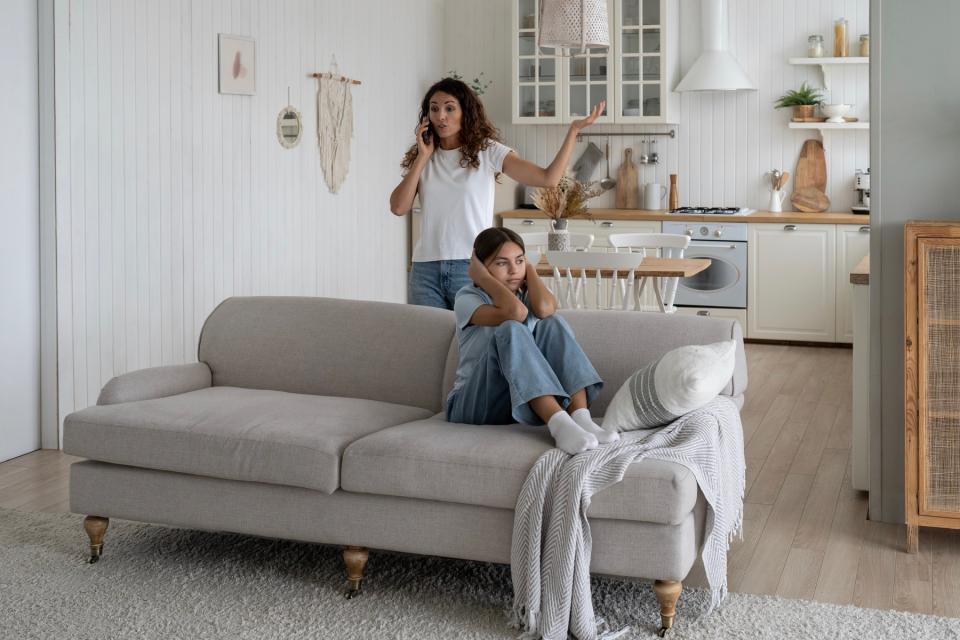How Divorced Parents Can Help Their Teens Make Healthy Relationship Choices
A teen with divorced parents might fall into the unhealthy relationship patterns they’ve witnessed. But lecturing or making strict rules creates conflict. If you’re concerned, get curious: Ask questions that inspire your teen to reconsider on their own.
When your parents have a high-conflict divorce, you might not have a good model for healthy relationships.
“Children grow from where they're planted,” says Jamie Niesen, parenting coordinator, child custody evaluator, and licensed professional clinical counselor. “What parents model is critical in how children perceive ‘healthy.’
“We're modeling for our kids not only how they should expect to be treated, but also what is expected regarding how they treat others.”
Niesen adds, “If you have two very contentious parents, or parents that struggled with some emotional or physical abuse in front of the child, the biggest challenge is that there's not really a model for what's appropriate in reference to communication and respect and safety. How can the teen know if a relationship is healthy?”

Our mental health experts explain some common relationship patterns they see in their teen clients with divorced parents include abusive or controlling behaviors, people-pleasing, parentification, and feeling like they have a smaller voice.
Verbal, physical, or sexual abuse
“Verbal and physical and sexual abuse would be top-of-mind concerns,” says Dr. Cynthia Sortisio, clinical psychologist, forensic custody evaluator, guardian ad litem, and parenting coordinator. “Do you recognize what unhealthy patterns are, if you've lived in a family where there's been unhealthy patterns?”
Controlling behavior
It’s common for teens to get into controlling relationships—from either side. “Teens are prone to falling into this pattern because they don't know how to be in relationship with each other,” says Dr. Sortisio. “They’re trying to figure out what shows caring, what shows loyalty, and what slides over the edge into control.
“It can be challenging for teens to recognize. ‘How many times a day do we text each other? How do we act when the person doesn't respond or doesn’t respond quickly enough, or what we think is quickly enough?’
“Control can feel caring and cute and sweet, like, ‘Oh, he doesn't want me talking to other guys.’ But what does that really mean?
“That’s challenging for parents to help teens see, that's not really a sign of love. That's more a sign of control.”
People-pleasing
When parents don't get along, many teens turn towards people-pleasing. “A lot of them get stuck in that pattern because that's how they've survived the divorce and the high-conflict co-parenting relationship,” says Micaela Van Dine, forensic therapist and custody evaluator. “They survived by people-pleasing in order to keep either one parent or both parents happy—sometimes at their own expense.”
“It feels like a necessary survival mechanism,” Van Dine adds, “but it's probably the most destructive for the child.”
Having a smaller voice
“We know that kids who observe conflict tend to have a lot more isolation,” says Niesen. “They don't have a stronger voice. Their voice isn't heard because they're reminded that anytime they might have an issue or a problem, it's going to be met with defensiveness, conflict, and likely minimization.
Subsequently, children learn to stay small, isolated, hidden. They’re not going to assert themselves. Or if they want to assert themselves, they have learned to do it in that high-conflict way, because that's the only way that works.”
Cognitive distortions, like mistrust or a fear of abandonment
“I see a lot of cognitive distortions,” says Van Dine. Mistrust, trouble opening up, and a fear of abandonment are common. “As they go into these relationships, they’re believing, ‘This person's going to leave me.’
“Teenagers are already volatile and insecure. So they project whatever issues they're having with their parents onto their partners. And that's true going even into their twenties, thirties, forties, if they don't deal with the issue.” (That’s why therapy can be crucial.)
Jealousy and feeling left out
Dr. Sortisio says some teens “go through a stage where they feel like everyone else has a significant other, and they're the only one who doesn't. And that could be true at times. It feels like, ‘Oh, it's never going to happen for me,’ and it can feel really lonely.” This can make teens “feel compelled to partner up just to have somebody.”
Immature avoidance
Some of Niesen’s teen clients have boyfriends or girlfriends, but don’t give those relationships any serious weight. As a result, they minimize the experience of dating and reciprocity within relationships. This is partly a good thing: Their lives are full enough that they don’t need to fill a need by dating.
“And yet also,” says Niesen, “that's not how real relationships function. With the help of electronic devices, adolescents are quick to respond, often with impulse or poor emotional regulation. Just as likely, they may avoid the discomfort of confrontation and processing and simply ignore their partners.
“As parents, we want to model approach, reflective listening, and successful repair of misunderstandings in relationship.”
Parentification
Some teens have experienced parentification—when a parent shares too much adult information, stress, tasks, or emotions with their child. These teens tend to take relationships very seriously. “They carry the weight of the world on their shoulders,” says Niesen. “They believe they are a lot more capable than they really are, because that's how they've been forced to deal.
“In these circumstances, we often see children attempting to behave as adults but only with their limited frontal lobe development.”
Be curious, not controlling.
The nice thing about asking questions is that you’re not being controlling or commanding. You’re giving your teen the opportunity to think through things on their own. If you tell them they’re doing something wrong and must stop, they might retort, “Well you and Dad…” or “But you and Mom…” If you get curious instead, they might start internally questioning whether their relationship is healthy.
Here's a list of questions you could ask your teen. They’ll help you get a sense of how their relationships are going. Most of all, these questions will trigger some internal reflection.
Do you have fun together?
This question might seem unnecessary, but it’s important. “Especially for kids who've maybe come out of an unhealthy marriage,” says Dr. Sortisio, “they may not realize how much a healthy marriage is about being best friends and having fun together. It sounds so basic. But I have definitely seen in my clinical work that it's not to be assumed.
“I used to think, ‘Well, that's a given. Of course you should be best friends and know how to have fun together. Isn't that how you got together in the first place?’
As dating apps become more popular among teens, the starting point of a relationship shifts from friendship to physical appeal. “Because they saw a picture,” says Dr. Sortisio. “And then maybe there was something in a description, and who knows how accurate that description was.
“But hopefully, what comes next, as you get to know each other, is that you find things in common, and you have fun together. Because if you can't even have fun together, what are you building on? What's the point?”
How do you navigate problems together?
All relationships have problems. If your teen’s relationship has a problem, that’s not inherently bad. But help them think through these questions: “Are you figuring out a style to navigate problems? And are your styles compatible? Are you growing together in that way?’
“Because sometimes,” says Dr. Sortisio, “these kids have come out of a family where they haven't learned how to navigate conflict.”
Do you feel good about your relationship most of the time?
“Fights are going to be inevitable,” says Niesen, “and that's a part of going through relationships. But overall, do you feel good with the person you're with most of the time?”
This might seem basic too, but if teens are used to witnessing unhealthy relationships, it might feel normal to them.
Do you feel good about yourself in the relationship?
“I couldn’t put enough emphasis on this one,” says Niesen. “It's really heartbreaking to hear, ‘I'm never going to be good enough for him. I'm never going to be thin enough for him. I'm never going to be pretty enough.’
“What is happening in that relationship? If you feel that way about yourself and there's something happening in the relationship that reinforces that message, then we are setting up children to seek external validation and potentially become isolated victims in unhealthy relationships.”
Do you feel comfortable and safe?
This seems like a reasonable, helpful question. But it’s not as useful as it seems, because it might look different to your teenager. “We're talking about kids whose frontal lobes are not fully developed,” says Niesen. “If they're watching divorcing parents, or they've been in that contentious home, comfort probably actually looks more like insecure attachment.”
Feeling comfortable and safe is important in teen relationships. “But oftentimes, especially if there's an abuse history, we recognize that a young lady might feel safe with a partner who's really domineering.
It is unfair to assume our children have the capacity to understand ‘comfort and security’ in a developing teen relationship.”
Do you trust them?
This can mean different things to different teens, Niesen explains. “I can trust that they're going to show up. I can trust that they're not going to cheat on me. I can trust that they're not going to talk behind my back. I can trust they're going to call me when they say they're going to.”
The important thing is whether they can rely on that person.
Do they trust you?
“Do you show up for them in a way that's consistent?” Niesen asks. If you don’t, it might not be the right fit for you—or maybe you’re not ready.
“Or at least do you try really hard? But no matter what, somehow they keep getting mad at you for something?”

Are you still having fun with your friends and family and hobbies and interests?
Isolating from friends, family, and interests can be a sign of an unhealthy relationship. It could be abusive, or, at minimum, obsessive. So ask your teen if they still participate in other areas of life.
“If a teen’s whole life is about this other person, that's not healthy,” says Dr. Sortisio. “It's not healthy for any of us. Even in a happy 50-year marriage, people have their own interests, and part of being in a relationship is figuring out the balance of your independent selves, and then being together.”
“Hobbies and interests are really critical components,” says Niesen. “When I'm interviewing kids or teenagers, I want to see where their self-efficacy is, where their self-concept is. Are they only able to define themselves in reference to that person? Or are they talking about other things, and the boyfriend or girlfriend just happens to be one little piece, but not their whole identity?
“That's why I think it's really important that kids, high schoolers in particular, have some kind of club, sports, drama, choir, something. Something else that requires their time, dedication, motivation, and energy outside of that relationship.”
Are they pressuring you?
“This is another tricky one,” says Niesen. Some people may ask, “Are they pressuring you to do something you’re not ready for?” But that’s the wrong question. The emphasis is on pressure, not about assessing if I am ready or not. Pressure is pressure, and this results in feeling that are associated consequences with my choice. This is not a position we want our children in. Also, adolescents like to think they can handle pressure, as such we want to treat these conversations as opportunities to discuss whats happening and how to respond. Build your child’s self-confidence to be assertive.
What makes you interested in them?
Your teen will likely be happy to talk about their romantic partner’s positive traits. If it’s a healthy relationship, they’ll have plenty to talk about, and you can get a glimpse into their world. If they struggle to answer the question, they’ll notice a problem.
What do your friends think about them?
This question offers a tremendous glimpse into your teen’s life. The friends likely have a different, closer view of the relationship than you do. So if your teen answers, “They would say he's too controlling,” that’s useful information.
“Kids identify with their friend group, and it becomes a big source of their identity,” says Niesen. Understanding how their friends view the significant others encourages parents to ask further, for example: “So tell me how that aligns with how you see this person.”
How did you meet?
This is another question that sets your child up to share about their lives in a way that excites them, rather than pressures them. It’s usually a fun story to tell, but you can still glean information from how it unfolds.
Do they hurt you?
This might seem basic, and your teen might not respond honestly. But if the real answer would be “yes,” then just asking the question will help them reflect and realize it’s not ok.
If they answer “yes,” encourage them to contact the National Domestic Violence Hotline, which is for any types of relational abuse. You can call, chat, or text. Or contact Love Is Respect, a project from the hotline that helps youth who are concerned about their romantic relationships.
Other ways to help your child make healthy relationship choices
There are so many ways you can set your child up for success—there’s a lot more to the story than lectures or questions. You can help structure and support your teen’s lifestyle in a way that organically nurtures healthy choices.
Find a therapist for your teen
“Teenagers are very observant,” says Van Dine. “And they can see the patterns that happen between their parents. They're pretty smart. They can pick up on the animosity. But with the help of a therapist, they can forge their own path in terms of communicating effectively and setting boundaries.
If your teen is struggling with an unhealthy relationship, they could benefit tremendously from therapy. “And don’t wait until your child is in a deep pit of despair,” says Dr. Sortisio. “It’s always easier in life to solve problems when they're small rather than large.”
Ideally, teen therapy is a collaboration. In addition to private sessions, you and your teen’s therapist should be talking. They won’t disclose anything confidential, but you can still give them a helpful perspective. “Tell that therapist, ‘I'm noticing my child engaging in this people-pleasing behavior’” (or whatever unhealthy pattern you’re seeing), suggests Van Dine.
“Children of divorce grow up without really seeing what boundaries look like, and just seeing a lot of conflict without a lot of resolution. So having a professional work with them on that is essential.”
“Not every kid whose parents are getting separated and divorced necessarily needs therapy,” says Dr. Sortisio. “But the messier the divorce is, and the more kids have been exposed to it and drawn into it and involved in it, the more a neutral 3rd party can really help kids separate themselves from their parents’ situation.”
Talk about what healthy relationships look like
“Have conversations about what healthy relationships look like. Meaning shared values, shared goals, common dreams. Some of the bigger things,” says Dr. Sortisio.
And “ask questions that help teens reflect on all kinds of relationships that they're in. Not just romantic partnerships,” says Dr. Sortisio, “but also friendships. So when your teen is talking about something negative—‘a peer did this, a friend did that’—they're talking behind their back, or something like that.
“Rather than giving them direct advice, which is typically not helpful, you can just ask those open-ended questions: ‘Oh, my gosh! Well, how was that for you? What were you thinking about with that?’ I think that's a more helpful strategy, sort of softly guiding them towards some of your values.”
Ask if you can share your perspective
Van Dine suggests this approach: “I’m noticing a pattern. May I share with you what I’m seeing?” She adds, “Just bring it up as if you are the older, wiser person, and that you are letting them know that you’re looking out for them. You’re giving them advice, and they can do what they want with that advice.”
This can actually build trust and bring a teen and parent closer together, says Van Dine.
“So if they say no, respect that, and maybe come back to it at a different time. If they still don't want to hear it, then it might be time to bring it up to the therapist.”
Don’t compare your teen’s relationship to your co-parenting relationship
For example, don’t say, “Oh, you're acting just like your mother.” Or, “Your boyfriend's treating you just like your dad used to treat me, and I can see this pattern—and you're just headed for trouble here.” Van Dine says, “That's not okay. That's going to cause the child to move farther away from that parent.”
Be a coach, not a bodyguard.
“You don’t want to be your teen’s bodyguard,” says Niesen. “You want to be the coach. Coaches encourage, and they inspire, and they train, and they offer advice when it's needed. But they allow their athletes to learn and grow through their experiences.
“So focus on just being the coach, being present, being involved, and being supportive, but not hovering, not controlling.”
Talk to the universe
“This is a trick we use in therapy,” says Dr. Sortisio. “We ask questions without asking questions that end in a question mark. Like, ‘I wonder how that made you feel. Oh, I wonder how that was for you, with everybody in the cafeteria watching when your friend dumped you like that. I wonder what that was like.’
“It's like a soft invitation. Because a question places a demand on the other person. Teens especially may or may not want to meet your demand. Wondering just lays it out there that you're curious. And you're interested in hearing without demanding information.
“I sometimes call it ‘talking to the universe,’” says Dr. Sortisio. “Maybe you're standing in the kitchen making cookies together, or putting dinner together, and you just start talking out loud about things.”
Encourage your teen to understand the goal of teen dating
When a teen starts dating, “You're figuring out how to date, and you're figuring out how to be a partner,” says Dr. Sortisio. “And so are the people that you're in relationship with. It's a really important learning process. You're learning about what's really important to you.” And what’s important to you will change between 12 and 17, for example, and again by 25.
“For the most part, people don't stick with the partner they found in middle school, or even high school. And that's not the point of exploring relationships in middle school and high school.
“I don't think you say that in the middle of heartbreak, but as part of broader conversations as our kids are growing up and maybe they're starting to show more interest in intimate relationships. They're having crushes, and you can start planting the seeds.”
Figuring out what you want in a partner
“I think finding a partner is like anything in life,” Dr. Sortisio says. “If you grab the 1st pair of shoes you try on, they might or might not be the best fit. Maybe you want to try some other shoes and see some you love even more, or that fit even better.
“But if you're in a rush to grab that first pair of shoes, you might overlook that it's kind of rubbing on your baby toe, or the size isn't quite right, or this wasn't really what you came in here looking for.
“It's okay to take your time.”
Learning how to be in a relationship
Teens might feel clumsy in their relationships because they’re just learning how to connect and communicate with someone on that level. They’re learning how to navigate problems in a new way. Teen dating offers a useful opportunity to explore that experience and gain some skills that will serve them well their whole lives.
Foster involvement in healthy activities
It’s healthy for your teen to have interests and activities aside from their romantic relationship. But they need your support. “As a parent, that means being willing to drive them and or pay for things and/or otherwise support things,” says Dr. Sortisio. “Like volunteering to be the Team Mom or Team Dad. There are all kinds of ways we can foster kids being involved in other things. And when you're busy playing a sport or playing the violin or being in the school play, there's just less time to fill life in with poor relationship choices.”
If your child is already in a bad relationship, it’s not too late to support their activities. “Then all their self-worth isn't coming from this unhealthy relationship. They can feel good about themselves because of the other things in their lives. “
Foster healthy friendships
“We also need to foster friendships that we do think are healthy,” Dr. Sortisio recommends. “So being willing to drive a posse of kids to the mall, or being willing to have kids at your house and feed them lots of pizza and snacks. We can subtly guide the behaviors and choices we want to foster more of.”
Spend time one-on-one time with your teen
“One-on-one time continues to be important even with our teens,” says Dr. Sortisio. “Even when they're not so interested in us. Making a point of connection with teens seems to happen when we watch shows together, or we eat together. We can do other things, of course, but those seem to be tried and true in a lot of families.
“Maybe you don't want to watch one of those survive-on-an-island type shows. But your teen’s really into it. Well, suck it up and join them. It’s just like when they were little: If you didn't like Legos, you still sat on the floor and played Legos.”
At this stage of life, teens are “simultaneously pushing you away and reeling you in,” says Dr. Sortisio.
The one-on-one time “lays a foundation for communication. If you want to have any hope of hearing things from your teen or them being willing to hear from you, just foster that regular point of connection.
“I think it's also how we keep tabs on where they are emotionally. Otherwise, we tend to be ships in the night. They pass through the kitchen and grab a snack, and they go up to their room. Or we're in the car for 10 min while we drive them somewhere.”
That one-on-one time “also fosters general relationship skills,” Dr. Sortisio explains. “This is how two people relate to each other. This is how two people sit and talk. It can model the layers of relationships.”
Teach your teen coping skills
The best way to teach is to model—so talk through your own coping skills, when it’s appropriate. If you’re not confident in your coping skills, consider individual therapy. If you know your teen needs stronger skills, consider putting them in therapy too.
“What are their coping skills—general coping strategies, not just about relationships?” asks Dr. Sortisio. “Do they have ways to soothe themselves, to feel better, to stay balanced, to be on an even keel?
“It's really about being a healthy person overall. Because if you're not a healthy person, just all by yourself, you're not going to magically become healthy in a relationship. Even the basics of eating well, sleeping well, and moving your body every day. Those are fundamental to mental health, and those things are challenging when you're a teen.”
Without strong coping skills, teens dealing with stress—including stressful dating relationships—often turn to substance use. “With teens, we always want to have our eyes and ears open about that,” says Dr. Sortisio.
Welcome your child’s girlfriend or boyfriend into the family
“Get involved,” Niesen suggests. “Invite that boyfriend to dinner, invite them on the family picnic or camping trip. Invite them over to watch a movie.
“If you're creating that safety, you're going to have more information. And that doesn't mean you're being nosy. It just means, ‘I care about what you're experiencing with this person and I would like to know them, too.’ Don't force it, but your child wants to know that you're interested.”
What if your teen doesn’t respond well?
If your teen doesn’t really respond to your questions, that’s ok. “When we talk to the universe, or when we just wonder aloud about things, we're planting seeds,” says Dr. Sortisio.
“So even if they're not responding the way we hope they would like (giving us a whole paragraph of their confidence, their secret information, and their thoughts and feelings that maybe we're so eager to have as a parent), we planted some seeds anyway.
“Now they are thinking about it. ‘Hmm! I have a friend who keeps betraying my trust. What do I do?’ And so that just bounces around in the teen’s head.”
Share what you liked about the other parent
Kids want to know if their parents’ relationship had value, even if it’s over. “As hard as this can be for a parent in a high-conflict divorce, it’s helpful for teens to hear about those things that we really value in the child's other parent.
“It fosters more healthy emotional development when we can help our kids understand that life isn't all black and white, that there are shades of gray.”
Manage your own anxiety
It’s understandable if feel stressed about your child’s iffy girlfriend or boyfriend. But “it’s important to manage our own anxiety as parents,” says Dr. Sortisio. Remember that most teen dating relationships don’t last. “Probably this isn't the person who's going to be sharing Christmas with you for the next 30 years. Trying to not be too anxious about that as a parent.”
How can a co-parenting app can make co-parenting easier?
Read the top five reasons here.
“With the families I work with,” says Dr. Sortisio, “I'm always emphasizing, ‘If you can't reduce your conflict, we at least have to encapsulate it. Then your children have hopefully no knowledge of it, or minimal knowledge of and exposure to it. That that's really a separate thing, just like it would be if you were having a really difficult time at work.
“Your children only need to know, ‘In case you see me being short-tempered, or something, it’s because of work stress. It's not you.’ Period. You don't go into details. You don't trash your boss. You don't gossip about your colleagues. None of that is appropriate to do with your children, and I would say the same thing about a co-parent.”
If the kids do overhear a lot of conflict, “That contributes to their anxiety and depression. If you're anxious or depressed, you may latch onto anything that helps you feel better in the moment, whether that's some alcohol, or some weed, or somebody who's telling you all the right things, even though maybe they're not the best choice in a partner.”
Don’t confide in your teen or badmouth your co-parent
Talking too openly with your teen can trigger parentification, a condition that makes kids feel like they have to grow up too soon. It happens when a parent shares too many adult emotions or too much adult information with their child.
“Parents have to remember that their teenager is not their friend and not their confidant,” says Van Dine. “It’s easy to be tempted to align with the teenager in badmouthing the other parent. Or talking an ‘us v. the other parent’ framework.”
But talking negatively about your teen’s other parent puts them in a really difficult position. It’s normal for a teen to love both parents, and making them feel like they have to choose can be intensely painful. It makes them feel disloyal and conflicted.
“That's not really modeling proper ways to deal with difficult people,” Van Dine explains. “It’s essentially stunting their growth in some ways. It’s not teaching them to stay high level and focus on their own behavior and their own contributions.
“Teenagers are going to vent their frustrations about the other parent to you,” says Van Dine, “and it's important to just listen to them with empathy. Try not to take their side; instead, really spend some time problem-solving with them and brainstorming about solutions that they can implement with the other parent.”
Resist the urge to share your own experience with your teen’s other parent: “He treated me that way, too!” (If you need to vent about your co-parent, find a better way to do it.) “Instead, focus solely on how you can support your child in navigating the situation. Tap into your own strengths in dealing with that person, whether it was setting boundaries, or self-care, or finding your voice, or reading self-help books, or going to a therapist.”
Empathize, don’t gossip
Sometimes, it’s tricky to draw the line between being honest about your co-parent and protecting your child. Most of the time, it’s best not to badmouth your teen’s other parent.
Van Dine suggests these responses: “I understand what you're going through.” “I understand how hard this is for you.” This type of response validates your teen’s emotions and shows that you care. “It shows that you're listening, that you very much want to hear what they have to say—but it doesn't say that you're agreeing with them 100%, or that you’re taking their side, or that there's a there's a wrong person and a right person.
“Tell your child, ‘Let's just focus on you, and how we can make this situation good for you.’”
What if your teen pushes for adult answers?
This is normal—but that doesn’t mean you should give the answers they demand.
Don’t lie, but do use discretion
“You never want to lie to your children,” says Van Dine, “but you do want to use discretion in terms of how much detail you share. Whatever you do, tell them an objective view of the truth. If you're telling them your own opinion, that’s not healthy. Stick to the facts, and leave all of the emotional details out of it.”
Family therapy
Family therapy can help you work through these tough conversations together. Sometimes, it’s helpful to have guidance when you’re navigating a complicated situation. And it can help you learn to communicate with your teen without taking their side.
Acknowledge your emotional reaction (face and tone)
Even if you’re working hard to stay composed, your face or tone might give you away if you’re upset. Teens pick up on these cues immediately.
That doesn’t mean you can’t feel emotion, says Van Dine. But instead of pretending it’s not happening, just acknowledge it in simple terms. “I'm sure I look upset right now. I'm just having a hard time. Please give me a minute. Let me give some thought to that, and let me get back to you.” Or, “I think I sounded snappy just now—let me take a moment to self-regulate.”
Setting rules can be tricky for co-parents. If your co-parent sets wildly different rules on their parenting time, how much of a difference does it really make? It still makes a big difference, says Niesen.
“We want both parents to support one another in the rules and consequences that they're going to reinforce around dating. But if they can't, it doesn't change what your responsibility is as a parent: to set up your own values and standards for the home.”
“The best piece of advice I have for parents,” says Niesen, “is recognizing that they have the responsibility of setting expectations in their own home. What do you want your child to believe about themselves?
“I have 2 girls at home,” Niesen adds. “I hope they believe that they are strong, that they are valuable, that their voice matters. That they have self-respect and they expect respect from other people.”
Align with your co-parent on values, not rules (if possible)
“If you have a healthy enough co-parenting relationship that you guys can agree on the expectations and standards and consequences, awesome,” says Niesen. Ideally parents can align on values, even if the actual rules within the home are not the same across homes.
“For example, ‘It's important that our daughter doesn’t text after 11 p.m. and is on time for curfew.’ This shows respect for space and availability (I’m not always accessible) and I have rules set by other people who care about me.
“So I ask, ‘Okay, in each of your homes, what do you want to implement to respect that value?’ They might have different curfews. But you've both decided it's important for them to feel safe, to feel valued, whatever it might be.
When your teen breaks the rules, choose discipline, not punishment
“Discipline is not the same as punishment,” Niesen explains. “Discipline means to teach. So we want to take these opportunities to teach and not necessarily to punish. We want to focus on making sure our child feels heard and giving discipline that encourages better behavior.
“Discipline is not about breaking up that relationship. We don't want to put our kids in a position where they feel like they're now forced to choose between us and the person they really care about.
“So if our daughter comes home late, are we going to say, ‘You're not allowed to see them anymore’? I don't think that's really going to work. I think she's going to get pretty defensive and find ways to see him. But we might say, ‘Okay, now your curfew got pushed back an hour or now your dates are in our home so we don’t need to worry about getting you home on time.’
“Whatever it might be, but I think consequences that indicate respect for the rules is important. That's more important than saying ‘he's a bad influence,’ or ‘she's a mess.’”
What if you’re dating, too?
If your teen isn’t the only one in the house who’s dating, it can create a different dynamic. “It's really weird to have your parent doing the same thing you're doing,” says Dr. Sortisio. “And parents can be goony when they're dating, in that new stage of a relationship. Who wants to see their parent being lovey-dovey and goofy?”
Conflict can arise when parents have different rules around dating—like if the teen has a 10pm curfew for dates, and Mom or Dad has no curfew. “But that's just true of so many things in life,” says Dr. Sortisio. “There's a lot of things that teens can look forward to when they’re older. We can have different rules as we age, just like you have a different bedtime when you're 6 than when you're 12.”
Get curious, not controlling
Your teen needs your support, advice, and involvement as they explore dating. But it helps to be strategic. The questions and suggestions in this article will help your teen feel safe opening up to you, and will give them the opportunity to do so.
We know how much you love your teen and want what’s best for them. Otherwise you wouldn’t be reading this article. If you get curious and ask questions (or “talk to the universe”), you’ll show your child you care, and you’ll help them think through their choices.



